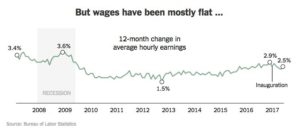This is a wonky and non-partisan blog. Polemics are “off brand” for me. But today’s post raises some legitimate concerns I have about the plummeting trust in most news media sources today, and if it seems like a bit of a rant, it’s probably because I have a personal history with journalism and I’m passionate about trying to uphold the integrity of the profession.
I was a journalism major during my undergraduate years. I never thought of it as a controversial thing. I grew up in a very traditional and conservative state, but being a “reporter” never seemed like an occupational choice that would raise eyebrows or cause social disapproval, the way announcing plans to be an “avant-garde artist” or “vegan activist” or “founder of a nudist colony” or “socialist organizer” would have.
To the contrary, local journalists, on TV and in the newspaper, were generally popular and well-respected where I grew up. There was more skepticism about potential bias from the national media, but no one I knew dismissed network nightly news as sheer lies and propaganda. People still relied on national news sources for information and facts about the world, while (understandably and commendably) maintaining independent critical thinking about what it all meant.
Continue reading Crisis of Media Legitimacy in the Digital Age
